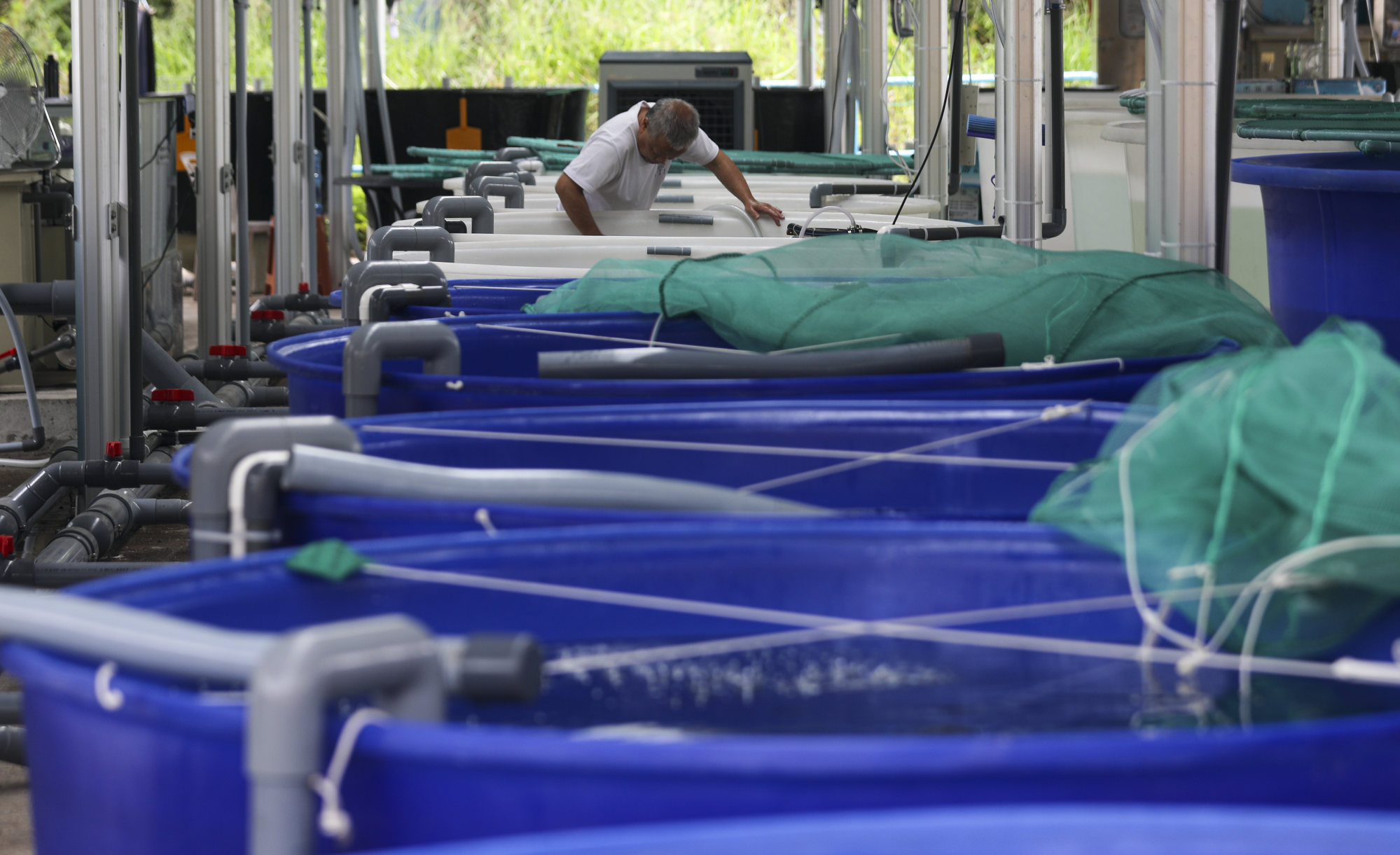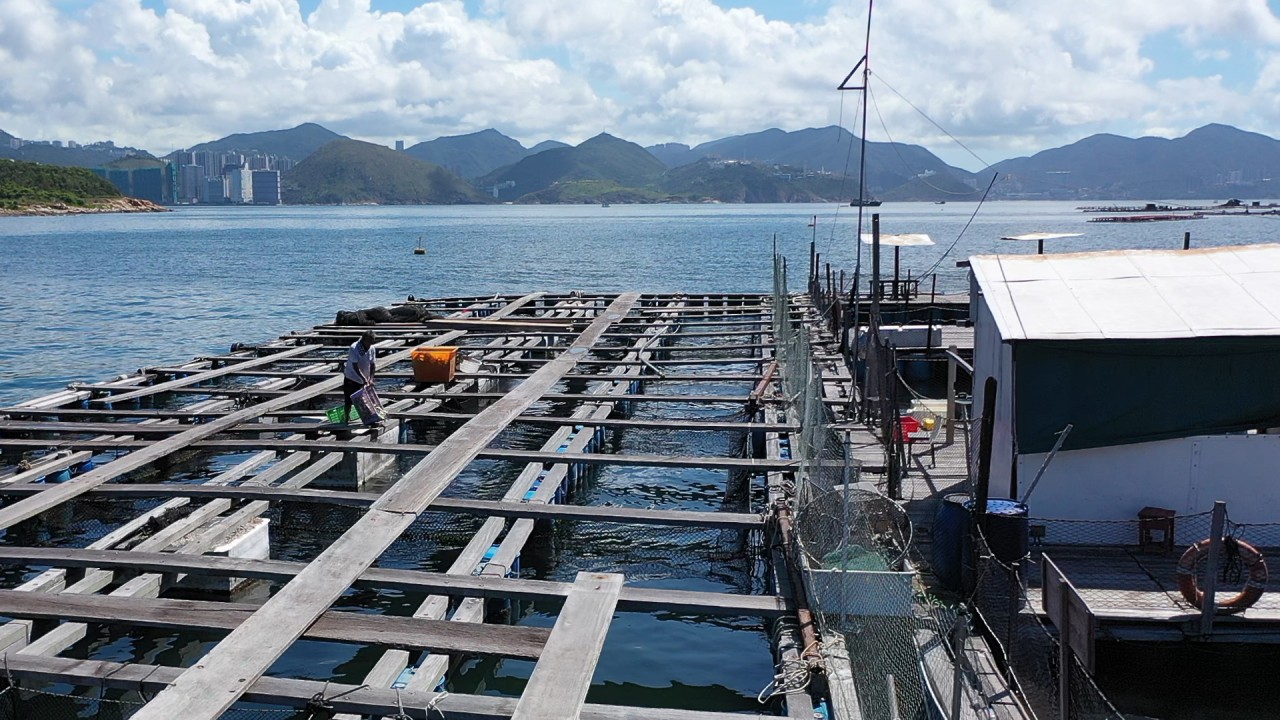
‘Make fish farming great’: Hong Kong veteran wants to share expertise, attract newcomers to jobs in fisheries sector
- Gary Wong made a fortune raising empurau, now he hopes to inspire others to start fish farms too
- ‘Lohas Plus’ project aims to create 300 jobs for underprivileged jobseekers, young people
Veteran Hong Kong fish farmer Gary Wong Po-man, 57, made a fortune rearing prized empurau freshwater fish, which his wealthy customers snap up at HK$5,000 (US$637) per kilogram.
Native to Southeast Asia and dubbed the most expensive fish in Malaysia, it is referred to variously as “king of the river”, “unforgettable” and “Borneo gold” – all testimony to its reputation for being exceptionally tasty. Even the scales are considered a delicacy, deep-fried.
Now Wong is ready to share his expertise, gained from more than 20 years in the business, and hopes to raise a new generation of fish farmers who can make Hong Kong’s lacklustre agriculture and fisheries industry shine again.

The co-founder of Smart Farming HK, which runs a 50,000 sq ft organic aquaculture farm in Tin Shui Wai, has partnered with social enterprise Sister Peer to create at least 300 jobs over the first three years.
Called “Lohas Plus”, it aims to help the underprivileged and younger people learn new skills, earn a living and go as far as they want in the business.
Wong, who is deputy chairman of the Hong Kong Offshore Fishery Association, will provide participants everything they need free of charge to get started, including fingerlings, fish ponds and facilities at a new 600,000 sq ft site in Sha Tau Kok, near the border with mainland China.
“They can start their own business by running the fish ponds at our site. We will teach them all the necessary techniques and provide everything they need for fish farming,” he told the Post.
“All they need to do is to invest their time into taking care of their fish. It takes a lot of effort and patience. We’ll undertake to buy and market their produce. This is a self-reliant business – the harder you work, the more you earn.”

Using solar energy, recycled waste water and treated food waste for fertilisers and fish feed, the site will be a base for fish farming, planting crops such as tomatoes, lettuce and cucumbers, production and retailing of fishing products, as well as marketing, catering, farm-to-table education and tourism.
Wong has earned a reputation as one of few fish farmers in the world to raise empurau, which is said to have a distinct flavour from feeding on fruit in the wild. His empurau get an avocado feed he developed himself, giving them a fragrant aroma when cooked.
Aside from raising the rare breed, he said the fish farming project could produce 200 seafood species including grouper, moonfish and crab, and tap overseas markets, particularly in Asia.
His project team is also keen to enter into agreements with other countries to fish in their territorial waters, using satellite and artificial intelligence technology and green fishing techniques, which are more efficient and sustainable.
“My ambition is to revitalise the agriculture and fisheries industry and make Hong Kong a business hub with advanced technologies, producing high-quality food. The world is suffering from a food crisis and Hong Kong will have a lot to offer and can be self-reliant,” he said.
“I also hope to create business opportunities for the needy and younger generation as Hong Kong is facing soaring unemployment and the economy has been battered by the Covid-19 pandemic.”
Among those drawn to the project is housewife Sara Ho, 45, who has been struggling to make ends meet since her 48-year-old husband had a heart attack and lost his job in a logistics firm last year. They have two daughters, aged 14 and 19.
Ho has been earning about HK$7,000 a month from part-time work and has to pay a monthly rent of HK$4,000 for their public housing flat.
She had such a difficult time trying to find work over the past four months that she sometimes felt depressed and in despair.
“Many firms have closed temporarily or prefer to hire younger people,” she said.
Then Sister Peer, a group which helps underprivileged women, told her about the Lohas project and offered to arrange a full-time job for her there.
“This project comes as a lifeline for me,” Ho said. “There are many jobs I can do, as a production worker for fish soup packets and dried cat food or retail sales.”

Sister Peer founder Vivian Chow Man-yi said the project hoped to create about 300 jobs in the first three years for fish farmers, salespeople, production workers and tour guides.
Priority in hiring would go to the jobless and underprivileged, and young people with an interest in the agriculture and fishery sector.
“It is very difficult for housewives to get a job as they have lost touch with society for a long time. We hope to help this group first,” she said.
Wong’s Smart Farming produces 300 tonnes of fish a year. He said vacant fish ponds in Hong Kong occupying a total of 3,000 to 4,000 hectares were capable of producing 1,000 tonnes a year.
“With our natural farming techniques using food wastes as fish feed, the amount of fish produced could rise 15 to 30 times if we use these vacant sites,” he said.


